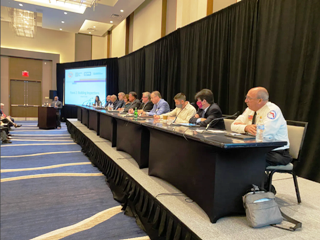WEST PALM BEACH — The deadly condominium collapse in Surfside hung over a series of panel discussions in West Palm Beach on Tuesday as engineers and building safety officials discussed what can be done to make structures in Florida safer.
|
Engineers, inspectors and safety officials discuss ways to make buildings in Florida safer during a series of panel discussions held Tuesday at the Hilton Hotel next to the Palm Beach County Convention Center. |
Jon Pasqualone, executive director of the Florida Fire Marshals and Inspectors Association, said it's unrealistic to presume that whatever changes experts suggest won't get sucked into a political vortex.
"All disasters are
political," he said. "Surfside is political. That little
tropical storm that just went through (the Florida
Panhandle) will be political. Until we fix the politics,
we're not going to fix the problem."
And that problem, Pasqualone said, is clear.
"Those buildings are getting older," he said. "They are not
getting newer. Whose problem is that? There has to be a
mechanism to deal with that. There's a problem, and that
problem needs to be fixed."
Safety starts with homeowner associations and building
inspections
A couple of themes came up repeatedly during the panel
discussions: cost-conscious and politically powerful
homeowner associations and the fact that only Miami-Dade and
Broward counties require buildings to be recertified for
safety every 40 years.
Homeowner associations, often comprised of older residents
whose numbers and consistent voting patterns make them a
political force, have the authority in Florida to determine
which experts examine their building and when.
"There needs to be a maintenance standard," said William
Sklar, chairman of the Condominium Law and Life Advisory
Task Force, a group created by the Florida Bar in the
aftermath of the Surfside condo collapse. "There has to be a
periodic inspection process. It should not be at the
discretion of the (association) board. They want to save
money. They go engineer shopping."
Champlain Towers was about to commence millions of dollars
in repairs when it collapsed. The costs of those repairs
were going to be borne by the association members, who,
according to The New York Times, were facing assessments
ranging from $80,000 to $200,000.
The association had been told the repairs had to be
completed in order for the 41-year old building to be
recertified.
Sklar said he'd like to see the state become more involved
in setting maintenance standards and possibly in moving up
the recertification timeline from 40 years to 25 or 30
years.
"There needs to be a uniform state standard, and it should
start much earlier than 40 years," he said.
A new recertification proposal for Palm Beach County
buildings is in the works
Building officials from across Palm Beach County are
considering a new program that calls for recertification of
buildings east of Interstate 95 every 25 years. Buildings
west of Interstate 95 would be recertified every 35 years.
Saltwater is thought to speed the deterioration of buildings
along the coast, prompting some experts to recommend earlier
inspections of those structures.
Also on Tuesday, Palm Beach County commissioners heard an
update of the recertification proposal put together by the
League of Cities’ working group, made up of building
officials from across the county.
Commissioners supported further discussions with the
insurance industry, property managers, engineers and other
parties. They indicated no qualms with the proposed
frequency of the inspections, the need for electrical or
waterproofing review or specifically which buildings should
undergo regular scrutiny.
Taking commissioners’ apparent satisfaction as a green light
to move forward, Assistant County Administrator Patrick
Rutter said staff would return to the board “in a couple
months” with a more polished document.
Commissioner Melissa McKinlay urged staff to be mindful of
the start of the legislative session, which will convene in
January.
“I’d rather have something on the local level before they
draft a pre-emption,” she said.
Vice Mayor Robert Weinroth expressed apprehension over their
ability to control the repairs that would need to be done,
ultimately paid for by condo owners. He pointed to reports
that the Champlain Towers South board knew about structural
issues from a 2018 engineering report, but struggled with
levying assessments on residents.
Another concern Weinroth had was the overload this program
may have on structural engineers.
“I think we need to have a recertification program, but
think we also need to recognize that Surfside may be an
aberration and we don’t need to be responding with our hair
on fire; that we need to take this carefully and make sure
that we are doing this in a proper process and not create
more problems in our zeal to protect our residents from a
potential calamity like we saw in Surfside,” Weinroth said.
Residents need to know building codes, inspection timelines
Panelists on Tuesday said it is important for residents to
know that building codes and even a rigorous inspection and
recertification regime won't guarantee that all building
failures will be prevented.
William Bracken, executive vice president of J.S. Held, a
global construction and safety consulting firm, pointed to
figures from the International Code Council showing that "80
percent of the buildings you go into and out of on a daily
basis do not comply with current code."
That doesn't mean the buildings are unsafe. Buildings
generally are only required to remain up to the code in
place at the time of their construction.
Bill Truex, president of a construction company and a
Charlotte County Commissioner, said he has seen shoddy work
that could threaten public safety.
"I don't now how you put in protections against the corner
cutters," he said. "How do we hold contractors accountable
when they take short cuts?"
